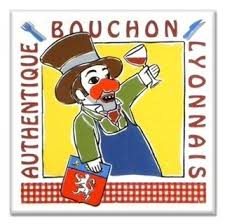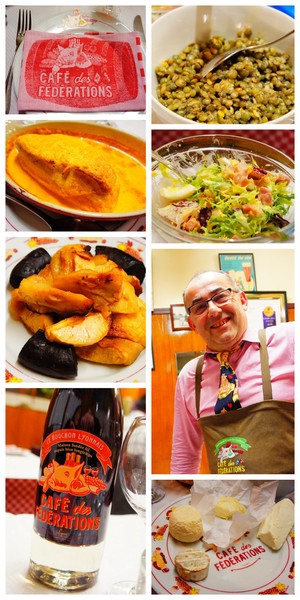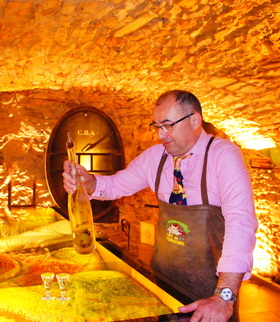LYON--This city southwest of Paris, the second largest metropolis in France, is also its gastronomic capital. It is the birthplace of the iconic chef Paul Bocuse (90 years old and going strong) whose eponymous eatery just north of town is emblematic of haute cuisine and whose towering influence has reached into the Lyon's very soul. The international, biennial chef's competition is called the Bocuse d'Or, and the city fathers even named the covered market "Les Halles Paul Bocuse."
 The prestigious but conservative Michelin guide has awarded 15 stars to various restaurants within city limits, dozens more in nearby towns and villages, but a savvy eater should bypass the dazzle (high-end cuisine can be found anywhere in the world, right?) in favor of establishments not found anywhere else. Those are its scores of bouchons, a bigger draw for visitors, according to the Lyon Tourist Office, than its gastronomic palaces.
The prestigious but conservative Michelin guide has awarded 15 stars to various restaurants within city limits, dozens more in nearby towns and villages, but a savvy eater should bypass the dazzle (high-end cuisine can be found anywhere in the world, right?) in favor of establishments not found anywhere else. Those are its scores of bouchons, a bigger draw for visitors, according to the Lyon Tourist Office, than its gastronomic palaces.
 Yes, bouchon means cork, but the origin of the bouchon lyonnais dates from earlier times. The word was originally bûche, a bush. (A bûche de Noël is a Christmas tree.) Coaching stops in the region would display a bush over their front gates to show that they stabled horses and offered sustenance to travelers. The fare itself was simple but hearty, and the tradition of the bouchon lyonnais came into being. The menu was heavily oriented toward pork--the whole animal, snout to tail--as well as offal (tripe, liver, sweetbreads). Sausages of all kinds, sabodet, rosette, boudin noir (blood pudding, the Brits call it). And wine, of course. Midway between lush vineyards of Beaujolais and the Côtes du Rhône, there's always plenty on the table, served in "pots," heavy-bottomed carafes of 46 centiliters.
Yes, bouchon means cork, but the origin of the bouchon lyonnais dates from earlier times. The word was originally bûche, a bush. (A bûche de Noël is a Christmas tree.) Coaching stops in the region would display a bush over their front gates to show that they stabled horses and offered sustenance to travelers. The fare itself was simple but hearty, and the tradition of the bouchon lyonnais came into being. The menu was heavily oriented toward pork--the whole animal, snout to tail--as well as offal (tripe, liver, sweetbreads). Sausages of all kinds, sabodet, rosette, boudin noir (blood pudding, the Brits call it). And wine, of course. Midway between lush vineyards of Beaujolais and the Côtes du Rhône, there's always plenty on the table, served in "pots," heavy-bottomed carafes of 46 centiliters.
Oh, and atmosphere. None of this haughty French waiter stuff. The proprietor is always on hand like a cheerful band leader, greeting guests, personally reciting the menu and taking orders (you select your main course and your dessert), while sassy waitresses deliver the dishes, insist you clean your plate, or bring more wine. The decor varies little from one bouchon to another: wood paneling, red-check tablecloths, assorted sports memorabilia, old-timey photographs, maybe a few rosette sausages hanging from the rafters. The bill, when it finally comes, is shockingly reasonable, around $30 per person (which includes taxes and a built-in tip). It's a predictable and reassuring feed, an almost religious experience.
And so we come to Yves Rivoiron, who took over the Café des Fédérations two decades ago. Thanks to rave reviews over the years (Patricia Wells in the NYTimes, for Americans; regular TV reports in Japan, etc.), there's probably no restaurant in Lyon quite as famous. Fame is a mixed blessing, however. It spawns imitators, knockoffs, wanna-be bouchon operators out for a quick buck. Ten years ago, someone counted over 300 restaurants pretending to be "bouchons." Too many travelers (and too many locals), the owners themselves felt, were being misled by restaurants offering a "bouchon" menu, if not the full-on bouchon lyonnais experience, so the old-timers (like Yves) banded together and created an association of "authentic bouchons."
 But the self-appointed organization gave way to infighting, backstabbing, clubby politics, all the predictable stuff. So the local chamber of commerce and the Lyon tourist office stepped in and created a new list, an officially sanctioned "label" for bouchons they deemed authentic. It bore 21 names, but it left out several of the most genuine and historic. Including Yves Rivoiron, who, you can tell just from looking at him, would be such an obnoxious troublemaker that he would give andouillette a bad name. On his website, he writes: we're a real bouchon lyonnais, but not officially authorized to say we are. What tripe!
But the self-appointed organization gave way to infighting, backstabbing, clubby politics, all the predictable stuff. So the local chamber of commerce and the Lyon tourist office stepped in and created a new list, an officially sanctioned "label" for bouchons they deemed authentic. It bore 21 names, but it left out several of the most genuine and historic. Including Yves Rivoiron, who, you can tell just from looking at him, would be such an obnoxious troublemaker that he would give andouillette a bad name. On his website, he writes: we're a real bouchon lyonnais, but not officially authorized to say we are. What tripe!
Sure, he could sue to get back on the official list, but why? To accommodate his clientele, he bought the shop next door and doubled his seating. When the shop across the street (a pedestrian alleyway, really) became available, he bought it as well, and doubled his seating again. He dug out his cellar and installed a bar for private tastings and digestifs. And finally, he broke tradition by opening on the weekends. Too revolutionary for some tastes, no doubt. Rivoiron pours two small glasses of locally produced poire William and just smiles. "A votre santé!" Cheers!
Leave a comment